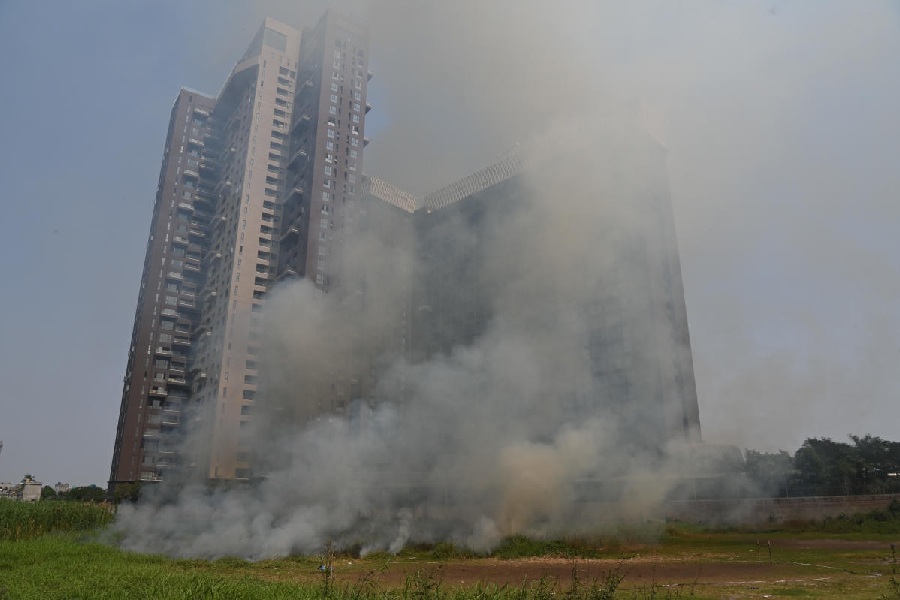Plumes of smoke rising from a vacant plot behind JW Marriott hotel engulfed that stretch of EM Bypass on Wednesday morning. Fires were also spotted on two vacant plots in New Town during the day.
A fire tender was sent to douse the flames on the vacant plot off the Bypass. In New Town, the New Town Kolkata Development Authority (NKDA) sent its water bowsers to douse the fires.
The vacant plots had heaps of garbage, which are suspected to have been set on fire. On one of the plots in New Town, near the Owl More intersection, paddy stubbles were set on fire.
Waste management specialists said any heap of solid waste contains plastic and other items, which when set on fire emit toxic fumes that can cause respiratory distress to people inhaling the smoke.
“Burning of plastic produces dioxins and furans, both of which are toxic elements. They are also carcinogenic,” said Brajesh Dubey, a solid waste management expert and a professor of civil engineering at IIT Kharagpur.
Burning of solid waste and stubbles in the open releases particles, which float in the air and add to the air pollution of that place. The particles include PM2.5 and PM10, both of which are major sources of air pollution in Indian cities, including Kolkata.
PM2.5 particles are so fine that they can enter the deepest crevices of the lungs and bloodstream and hit any organ. They are responsible for a host of critical ailments, including cancer.
“We were lucky that the temperature has risen and wind speed is higher than in winter. These factors helped disperse the pollutants fast. Had this happened in winter, the consequence would have been far more serious,” said an official in the state pollution control board.
The fires also highlight the gaps in the collection of solid waste across the city. Heaps of solid waste remain accumulated on many vacant plots and are at times set on fire.
When it rains, gathered garbage turns into mosquito-breeding sites.
“Our authorities still don’t recognise the problem. They say waste collection has no gaps, whereas in all Indian cities one can see piles of garbage on vacant plots and along roads,” said Dubey.
A senior official in the pollution control board (PCB) said incidents of fire on vacant plots around JW Marriott and the Silver Spring housing complex nearby were reported earlier, too.
“On at least one occasion, our officials went there. They suspect that a group of people had set the waste on fire to recover metals. The fumes that are generated when waste is burnt is toxic. Anyone exposed to it may develop respiratory distress,” said the official.
On Tuesday, the smoke had enveloped the stretch of the Bypass along the hotel. It was visible from some distance. “We sent one fire tender to douse the flames. There were heaps of garbage that were burnt,” said an official in the fire brigade’s control room.
In New Town, a bale of dried stubble was set on fire on an empty field behind the Tata Avenida housing complex in Action Area II. There was garbage, too, on the field.
A part of a grassland was set on fire behind the Owl More intersection, around 1.5km from Eco Park. Both fires were put out by water bowsers sent by the NKDA.
“We were alerted about the fires by residents,” a senior NKDA official said.
For the past several years, grassland fires and burning of waste have been reported from nearly all three action areas in New Town. Their numbers spike during winter, the official said.
The NKDA has taken measures to tackle such situations, including keeping water tanks equipped with high-powered pumps on standby and setting up a control room.
Apart from adding toxins to the air, such fires also burn the nests of birds of various species in the grasslands of New Town and destroy the habitats of small animals such as foxes.
Another NKDA official said they regularly send teams that are on the lookout for such fires.
